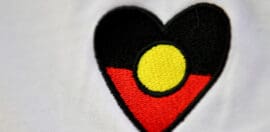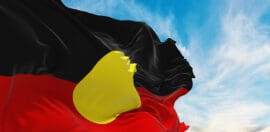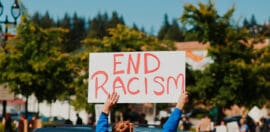‘We have important things to say’: Indigenous child briefs UN and calls on the Australian government to stop locking up kids

Image of Dujuan from the documentary In My Blood It Runs. Photo: Maya Newell.
9 September 2019 at 5:27 pm
A 12-year-old Arrernte/Garrwa boy from central Australia has travelled to Geneva to address the UN Human Rights Council and urge the Australian government to stop sending 10-year-olds to prison.
Dujuan, the star of the documentary In My Blood It Runs, has travelled with his grandmother and father to share his experiences with the youth justice system and build support for Aboriginal-led education models.
He will also brief the Committee on the Rights of the Child in advance of their review of Australia, and will attend a screening of the film at the UN with the support of the Australian government and the Australian Human Rights Commission.
Dujuan said he was excited to go to Switzerland as he has never been before, but he expected to be “a bit shy” to speak with all the countries at the UN.
“Because adults never listen to kids – especially kids like me. But we have important things to say,” Dujuan said.
“I am going to speak in the United Nations because our government is not listening. Maybe over there, they will.”
Australia has one of the lowest ages of criminal responsibility in the world, with children as young as 10 being arrested, charged and sent to prison.
Dujuan was 10 years old himself when he began struggling at school and was faced with increasing scrutiny from welfare and the police, captured in the documentary from filmmaker Maya Newell.
“I was so worried about being taken away from my family and I was nearly locked up in jail,” Dujuan said.
“But I was lucky because of my family. They are strong, they love me and they know I am smart. They found a way to keep me safe. I am alright now, but lots of kids aren’t so lucky.”
Dujuan’s message builds on the voices of legal, health and child rights organisations which have been calling on Australian governments to raise the age of criminality responsibility from 10 to 14 to bring Australian standards into line with international law.
Shahleena Musk, a Larrakia woman and senior lawyer at the Human Rights Law Centre who is also attending the council session, said it was a simple reform that would make a profound difference to many kids, like Dujuan, who just needed a helping hand to get back on track.
“These harsh and out of date laws are forcing too many Aboriginal kids into the quicksand of the criminal legal system. Any government that is serious about tackling our nation’s shocking over-imprisonment rates would make this one small change,” Musk said.
She told Pro Bono News many of the young children coming into contact with the youth justice system had complex issues in their lives, particularly related to neglect, trauma or disadvantage.
She saw firsthand, while working as a lawyer in the NT, that using the justice system only compounded that trauma, and resulted in adverse outcomes.
“What we’re doing is instead of trying to work out how do we support these children to stay in their communities, with their families and particularly in schools, we’re using the justice system to try to control and punish these kids,” she said.
“You’re effectively just reinforcing the same behaviour that, one would have thought, you were trying to change.”
Musk believes it is a lack of political will that is stopping the law from being changed.
But she hopes that hearing from a child who had been impacted by these laws and policies will have better cut through with the government than listening to lawyers.
“It should touch minds and hearts,” she said.
“Like Dujuan, when he speaks, he speaks truth. And I think that’s what the government needs to hear, from a child who has gone through these experiences and who has come out better on the other side, because of his family, because of his community and not from the intervention of the welfare system or justice system.”
Musk said it was important to recognise the intersectionality between school disengagement and the intervention of welfare authorities and then youth justice, that is in Dujuan’s story.
“These systems all act to harm and criminalise Aboriginal kids, rather than working to build on their strengths and ensure that they can be proud of their culture and their identity,” she said.
“I think that’s exactly what the United Nations will be looking at Australia about – why are Australian governments failing to address the overrepresentation of Aboriginal children in the child welfare and youth justice systems? Because I see it quite clearly, not supporting families, not supporting kids to stay in school, is leading to the interaction of youth justice and child protection systems.”







